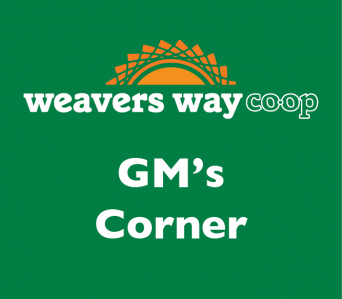
GM's Corner: Marching to Ambler — and Getting It Right

OPEN MEMBER FORUM
Thursday, March 16, 6-7 p.m.
Community Room, 555 Carpenter Lane
Got questions, concerns or ideas about your cooperatively owned business? Bring them to the table with General Manager Jon Roesser, staff and Board members and other member-owners.
For info and to RSVP:
www.weaversway.coop/event/weavers-way-open-member-forum-4.
In December 1941, with the fleet smoldering at Pearl Harbor and the Wehrmacht at the gates of Moscow, Winston Churchill was asked how long it would take to win the war. Churchill, seeing beyond the bleakness of the moment, his eyes always on the long game, responded,”If we manage it well, it will only take half as long as if we manage it badly.”
Indeed, proper execution leads to better outcomes. Churchill’s words should be repeated often in the coming months as we prepare to open our new Ambler store later this year.
The “Ambler project” — as we refer to it around here — is a massive undertaking for Weavers Way. The complex real-estate transaction and various legal negotiations are now mostly past us. The store design is nearly complete. We’re entering execution mode. Decisions made today will have long-term implications.
There are big things to consider. A cardboard bailer will cost us $5,000, but then we’ll be able to sell our used cardboard rather than pay someone to haul it away. About $20,000 will convert the existing HVAC system from electricity to natural gas, but we’ll save $4,000 a year in utility costs. It will cost up to $50,000 to purchase a new cash-register system, but sticking with the system we use in Mt. Airy and Chestnut Hill will only amplify its limitations.
Then there’s the mezzanine. Installing a mezzanine for offices will allow us to maximize floor space for retail and back stock, but it will set us back at least $100,000, pushing us to the limit of our overall construction budget. Do we spend that money and work to keep the rest of the project’s costs in check? Or do we forgo the mezzanine and sacrifice precious floor space?
Beyond the big expenses are a myriad of small things.
The store’s café alone will need tables, chairs, booster seats, receptacles for trash, recycling and compost, plates, cups, flatware, trays, bus tubs, napkin holders, a microwave, coffee urns . . . and so on.
Should we install an electric car charger? Pretty cool. But it will cost us a few thousand bucks, and evolving technology may render it obsolete in a few years.
Solar on the roof? Sure, if our landlord will allow it and we can find a third-party willing to incur the $175,000 price tag.
Like Mt. Airy and Chestnut Hill, Ambler has many community events in which we’ll want to participate, so we’ll need folding tables and chairs, tents and banners.
Don’t even get me started on all the whatnot: floor mats, latex gloves, twisty ties, mops, brooms, “Wet Floor” signs, mousetraps, register tape, soap dispensers, snow shovels, first-aid kits, extension cords, fire extinguishers, Sharpies, hairnets, beard nets, toilet brushes, clipboards, and, well, about a thousand other things.
We’ll need a button-maker, a laminator, a garden hose, an ice machine, a bike rack, and at least one barbecue grill.
We’ll have to hire 40 or 50 people, but when? Hire them too early and they sit idle, draining the Co-op’s payroll. Hire them too late and we’ll open the store unprepared.
Speaking of staff, kitting them out — T-shirts, hoodies, Castro caps, aprons, all made with recycled polyester and organic cotton — will cost $10,000.
The Co-op’s overworked communications staff will want to spend more money than we can give them, but we can’t ignore the need for marketing, advertising, events, posters, banners and branded merchandise.
The ranks of our partner, the Ambler Food Co-op, have swelled to an impressive 500-plus member households. We want 500 more before the store opens. That means applying resources to conduct outreach to neighborhood groups, religious groups, business and civic associations, local officials and other community stakeholders.
As we execute our plan in the months ahead, one thing is certain: We will make mistakes. We’ll spend money on things we don’t need. We’ll skimp on other things and later wish we hadn’t.
We can approach the future with confidence. We’ve chosen the very best building in the very best community. Through our partnership with the Ambler Food Co-op, we’ve established a cooperator core and customer base. Weavers Way Ambler will be a success, of this I am certain.
How successful will depend on how well we do between now and Opening Day.
See you around the Co-op.
